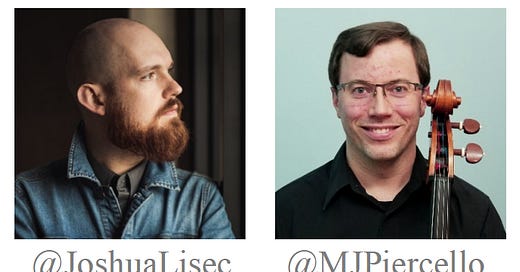Chapter 1 (0:00 - 4:42): Joshua and Matthew introduce us to the Problem-to-be-Solved.
Abridged Transcript highlights:
(0:00) Joshua gets us rolling
(1:33) “it seems impossible to have a conversation…”
(2:06) Matthew joins the fray
(3:59) “what's behind the words that's causing our conversations to explode?”
(0:00) Joshua: Yes, so the context here is that you and I have been having a conversation about how to talk to “people we find it very difficult to talk to.”
Now, what started our conversation yesterday was, Scott Adams had a viral tweet garnering 24 million views, in which he said that it is generally not possible to have a productive conversation with a Democrat: “Today I learned that being a Democrat requires talking over anyone who knows what is real.” And, this has been my own experience as well! Scott and many others have really been struggling with having productive conversations with liberals, leftists, or progressives, because everything devolves into “whack-a-hoax” very quickly.
(0:57) I shared with you yesterday that I know people personally who believe there’s a national registry to which all women’s cycle-tracking apps are reporting, and that there’s a federal database logging every time a woman anywhere in America becomes pregnant. They believe that Elon Musk now has Social Security numbers for everyone. I know people who refuse to open a bank account right now because, well, “Elon Musk is just gonna empty it and take my money.” These people who believe this, they are doctors, they are entrepreneurs, they are educated. They are not, in any sense of the word, idiots. And yet, it seems impossible to have a conversation with them.
(1:37) What you shared yesterday in our private conversation, Matthew, is what brings us together today. You, being a self-styled autistic savant, storyteller, wizard, and a performing classical cellist and cello teacher, you have developed a good technique from your various travels, adventures, and journeys, and I think it can be useful to a lot of people.
And that’s the preamble, or the context, of our conversation today. That sound about right?
(2:06) Matthew: Fantastic, thanks Joshua. “Autistic savant” is a self-diagnosed shorthand. If you prefer, I can be “artistic servant” instead (laughs), but yes, I am a career professional cellist. Not at the moment, because we’ve moved recently and it takes a while to infiltrate the local scene, but yes. I’ve been playing cello for 40 years. I’ve taught perhaps a hundred students, played many hundreds of concerts, thousands of rehearsals—all in all, I have spent tens of thousands of hours behind my cello.
(2:37) So, if you think about—you think about, you know, what an orchestra does is, we have to get together and put on a concert and somehow come to an agreement on what we're all doing on stage together, without having the benefit of being able to talk to each other about it. We have to make, to dial in the notes, you know, without resorting to words. So we spend a lot of time getting into each other's headspace in rehearsal, in such a way that if I do something you don't expect, you can still work with it (and the other way around). We have our fights, but it lends a different sort of a perspective to this stuff. So that's where I came from.
(3:22) Now, I'm also the sort of cellist who has power tools. I've done a lot of wood and metal working too. So I'm very interested in how things go together. And when you combine those two things, you get this sort of structural sense of how to build things that's very highly connected to nonverbal ways of seeing.
(3:44) And what that nonverbal vision of mine does, in this application, is it renders a whole other layer visible. Because most of the time (as you were introducing), conversations are in words. Well, that's wonderful, but what's behind the words that's causing our conversations to explode? And I think we can get at that stuff and develop toolkits, if you will, for sort of navigating that kind of a mess.
(4:14) I'm reasonably comfortable being extemporaneous, but my natural internal language isn't verbal. It's musical—I think in broadband symphonic flows, not in words or images. So if my conversation is a little halting, that'll be why.
(4:31) That's where I'm coming from. Where would you like me to focus, so we can be most useful to everyone who's listening?
Links:
full-length Twitter Spaces, the original audio, hosted by Joshua Lisec
full-length copy on YouTube, uploaded by Matthew Pierce
Chapter 1: Introduction (you are here)
Chapter 2: Overview
Chapter 3: Prepare for Battle
Stay tuned for further installments.



